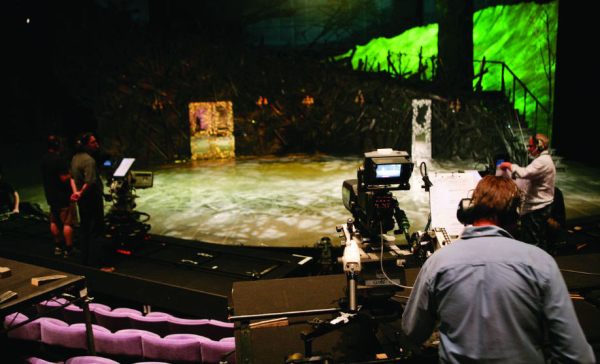Michael Coveney: Does The Vote, London Road and NT Live spell death to theatre?
‘There’s so much overlap now between screen and stage that we must guard ever more vigilantly to maintain the distinction between them’

© Simon Annand
Any moment now, if not already, many more people will be watching theatre on screen than are watching theatre in theatres. The live broadcast of The Vote on election night attracted an audience of over half a million, surpassing the 180,000 who watched the NT Live broadcast of the Donmar's Coriolanus starring Tom Hiddleston.
To which, I'm afraid, I say, so what? Three points:
1) The Vote on More4 wasn't good television, or film, any more than the screening of Mike Leigh's Abigail's Party (a stage play with cameras stuck in front of it) constituted great television. The Vote looked and sounded scrappy and second-rate. The best television play I've seen lately was the Bafta-winning Marvellous on BBC2 iPlayer, a brilliant melding of fictional characters and the real-life characters themselves in the story of an apparent "simpleton" and Stoke City kit man Neil Baldwin, played unforgettably by both Toby Jones and Neil Baldwin himself.
2) Donmar artistic director Josie Rourke says the figures indicate a big appetite for "new plays live on television." Maybe, but "live theatre" on television takes us right back to the bad old days of ill-prepared performances at Alexandra Palace and Brian Rix farces transmitted live from the Whitehall (now the Trafalgar Studios). The public's appetite for good stand-alone British drama on TV goes unsated and un-catered for except in American imports, soaps and formulaic police dramas; which don't count.
3) Donmar executive producer Kate Packenham says that reaching more people with the Donmar's work "is at the heart of our mission." Really? I thought that doing the best work you possibly can in the theatre itself was the priority. Everything else (the live broadcasts, the excellent education work, the Broadway transfers) is an essential bonus, not a raison d'etre.
The whole NT Live phenomenon has been goosed by Rufus Norris's superb cinematic makeover of London Road by Alecky Blythe and Adam Cork, screening via NT Live on 9 June before going on general release three days later. This is a landmark event of musical theatre on the screen – but as musical cinema which somehow also preserves the 2011 stage atmosphere of an enquiry among the residents on the Ipswich road where the murderer of five prostitutes lived for ten weeks over the Christmas period in 2005/6.
We know Norris is a natural filmmaker. His Broken (2012) was a compelling study of violence in a fractured family, technically assured, and brilliantly acted by Tim Roth, Rory Kinnear and Cillian Murphy, among others. The producers included Bill Kenwright and literary agent Nick Marston. Marston is aboard this time, too, as Norris makes a seamless transition between stage and screen, casting Olivia Colman as Julie, the leader of the garden festival renewal on the street, and moving his stage Julie, Kate Fleetwood, into a newly expanded role of a surviving, Madonna-like prostitute, gliding through the neighbourhood with a mixture of battered serenity and bitter resentment.
Above all, on film, you get a heightened sense of secrecy between people and the ambiguity of both thought and appearance. There are several shades of male shiftiness here with Tom Hardy's sullen-tempered cab-driver, Mark Lockyer's peculiar unattached passer-by and, especially, Paul Thornley as a furtive, over-voluble neighbour. Many of the original NT cast – Clare Burt, Claire Moore, Nick Holder, Rosalie Craig, Howard Ward are still on board, with the delightful additions of Anita Dobson, Linzi Hateley, Janet Henfrey, Hardy of course, Jenny Galloway and Alecky Blythe herself as a television newsreader.
Norris's NT team of musical director David Shrubsole, designer Katrina Lindsay, choreographer Javier de Frutos are joined on the movie by playwright and screenwriter Moira Buffini (another Norris NT regular). And the ensemble, operatic bits you'd have thought would be tricky on screen, all work brilliantly, not least the young girls' cheeky "You automatically think it could be him," in the concrete market place segueing into the first "movie song on a bus" sequence since Cliff Richard and Una Stubbs in Summer Holiday; and that's not where they're going.
There's so much overlap now between screen and stage that we must guard ever more vigilantly to maintain the distinction between them. Because more people see cinema does not therefore make it a more valid or influential medium than theatre, any more than the comparative minority appeal of theatre makes it a non-popular activity; more people go to theatres, after all, than go to football matches.
And now cinema advertises the theatre. On a visit to my local Odeon to see Helen Mirren in Simon Curtis's fine Woman in Gold, deftly scripted Alexi Kaye Campbell, the feature was preceded by brash and noisy invitations to see Ralph Fiennes in the NT Live screening of Man and Superman and the Shakespeare Globe's five recent productions, including Eve Best as Cleopatra; catch the excitement of the real live theatre at a wide screen near you!
Simon Curtis and Alexi Kaye Campbell are both Royal Court alumnae. So is American playwright Phyllis Nagy (a protégée of Stephen Daldry in his time there) and it sounds as though she's hit the jackpot at the Cannes Film Festival with Carol, her screenplay of Patricia Highsmith's novel of lesbian love in the 1950s, directed by Tod Haynes and starring Cate Blanchett. Let's never forget that 80 per cent of what's good in cinema started in theatre, anyway, especially in the British cinema, and London Road will become the latest exemplary beacon not of "live or digital screening" but of genuine cinematic creativity.
London Road premieres in cinemas nationwide in 9 June – more info here












